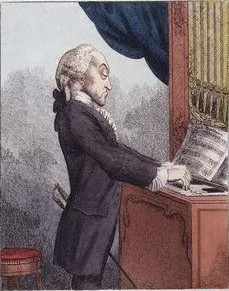 notAmos Performing Editions 1 Lansdown Place East, Bath BA1 5ET, UK +44 (0) 1225 316145 Performing editions of pre‑classical music with full preview/playback and instant download |
Thomas Arne
(1710 - 1778)

When icicles hang on the wall
(S./T.Fl.2Vn.Vc.Kbd.)
Score, part(s) and cover page (PDF), €1.00 for bundled copies Buy this item(1710 - 1778)

When icicles hang on the wall
(S./T.Fl.2Vn.Vc.Kbd.)
If you have any problem obtaining a PDF, please see our help page. If that does not resolve the issue, please click here.
For licensing/copyright information please click here
| Enquire about this score |
| About Thomas Arne |
| Full Catalogue |
| About us | Help, privacy, cookies |
| About Thomas Arne |
| Full Catalogue |
| About us | Help, privacy, cookies |
Pub. c.1750 "The Owl. Written by Shakespear in Love's Labours Lost. It is a description of winter as the cuckoo song is of the spring."
Lyrics: William Shakespeare
When icicles hang by the wall
And Dick the shepherd blows his nail,
And Tom bears logs into the hall,
And milk comes frozen home in pail;
When blood is nipp'd and ways are foul,
Then nightly sings the staring owl,
Tu-whit, tu-whoo, a merry note,
While greasy Joan doth keel the pot.
When loud the wind doth blow
And coughing drowns the parson's saw,
And birds sit brooding in the snow,
And Marian's nose looks red and raw;
When roasted crabs hiss in the bowl,
Then nightly sings the staring owl,
Tu-whit; tu-whoo, a merry note,
While greasy Joan doth keel the pot.
When icicles hang by the wall
And Dick the shepherd blows his nail,
And Tom bears logs into the hall,
And milk comes frozen home in pail;
When blood is nipp'd and ways are foul,
Then nightly sings the staring owl,
Tu-whit, tu-whoo, a merry note,
While greasy Joan doth keel the pot.
When loud the wind doth blow
And coughing drowns the parson's saw,
And birds sit brooding in the snow,
And Marian's nose looks red and raw;
When roasted crabs hiss in the bowl,
Then nightly sings the staring owl,
Tu-whit; tu-whoo, a merry note,
While greasy Joan doth keel the pot.
